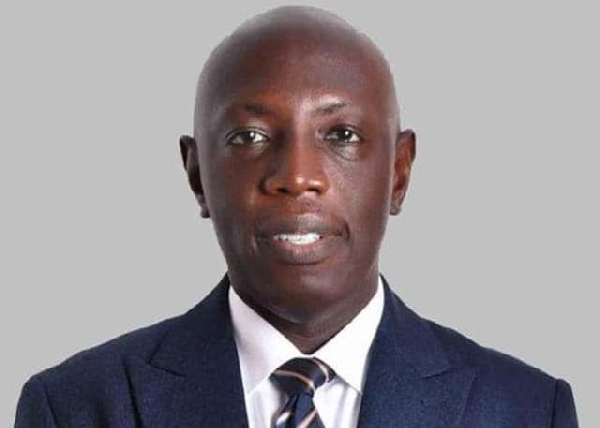The Institute of Economic Research and Public Policy (IERPP) has released its independent assessment of the government’s performance under the 2025 Budget, awarding an overall score of 40.5 percent after evaluating key policy actions, fiscal measures, and sectoral reforms.
Presenting the findings at a press conference held at the Ghana International Press Centre (GIPC) on Thursday, November 20, 2025, and themed “The 2026 Budget: Ambitions, Pressures, and Possible Pitfalls,” Prof. Isaac Boadi, Dean of the Faculty of Accounting and Finance at the University of Professional Studies, Accra (UPSA), and Executive Director of IERPP, emphasised that the institute’s analysis is grounded in data, not politics.
The Institute of Economic Research and Public Policy (IERPP) also delivered its preliminary assessment of the government’s performance ahead of the 2026 Budget, awarding the administration an overall score of 40.5 percent after evaluating key policy areas, fiscal reforms, and sector-specific interventions.
Presenting the findings at a stakeholder forum, Prof. Isaac Boadi, Dean of the Faculty of Accounting and Finance at the University of Professional Studies, Accra (UPSA), and Executive Director of IERPP, stressed that the institute’s work is evidence-based, not politically motivated.
“As a group, we do not come simply to critique. We are not interested in needless criticism,” Prof. Boadi said. “We support this administration the same way we support Ghana. They are Ghanaians first. Whatever we do, we give credence where it is due. If there are successes, we will say so. We are not here to critique anyhow.”
Tax Reliefs and Reforms Earn Administration Early Commendation
According to the IERPP, several tax reforms and policy adjustments introduced in recent months influenced the overall scoring. These included the abolition of the 10 percent betting tax, the removal of VAT on insurance, the elimination of the 1.5 percent withholding tax on all processed goods, and the removal of certain emissions-related levies.
Prof Boadi disclosed that these measures contributed to a 50 percent weight assigned to the first evaluation item, delivering what he described as “a huge mark” for the government’s policy responsiveness.
Arrears Audit Saves GH¢10 Billion
A major component of the assessment was the government’s ongoing arrears audit and validation programme.
Prof. Boadi revealed that out of an estimated GH¢68 billion in arrears submitted for review, GH¢47.8 billion was validated, while GH¢10.4 billion was rejected as fraudulent. He added that GH¢2 billion was reclassified, and a further GH¢8.6 billion remains under review.
“In effect, the government saved the country GH¢10 billion,” he noted.
IERPP assigned the arrears audit a 5 percent score, based on criteria including relevance to citizens, the size of the budget item, and the impact on overall public finance indicators.
Energy Sector Reforms Score 5%
The institute noted progress in the renegotiation of Independent Power Producer (IPP) contracts, improved gas supply, and implementation of the weighted average cost of power projects. However, Prof. Boadi indicated that the scale of reforms was still “not at the magnitude expected,” leading to a modest 5 percent score for the sector.
On social interventions, the IERPP noted that the government implemented several evidence-based programmes, including the payment of examination fees for 471,000 BECE candidates, the licensing of 16,000 teachers, the distribution of 6.6 million sanitary pads, and support offered to more than four million beneficiaries across various initiatives. The institute again scored the social sector 5 percent, stressing that its ratings were strictly grounded in verifiable evidence.
In the area of infrastructure, the IERPP acknowledged modest progress, citing the completion of 75 percent of the 70-kilometre runway project and the continued implementation of road and related works. However, with what it described as “no major reforms” recorded during the period, the administration received 5 percent for infrastructure development.
The government earned another 5 percent under digitalisation and public financial management reforms. The institute pointed to key gains such as the migration of 549 institutions onto the GIFMIS platform, the enrolment of 17 million citizens onto the Ghana Card system, the decentralisation of passport services, and the rollout of the electronic VAT system.
In the mining sector, the IERPP awarded a 5 percent score, noting limited transformational progress despite increases in small-scale gold production and last year’s purchase of 137.7 grams of gold by the Ghana Export-Import Bank. The institute stressed that persistent concerns over mining governance, galamsey control, environmental protection, and climate commitments remain largely unresolved.
Final verdict
Summarising the institute’s final verdict, Prof. Boadi stated that the government’s performance from March to the date of the budget presentation amounted to 40.5 percent, reflecting what he described as the delivery of “less than half” of the administration’s stated agenda. He explained that tax reforms, arrears audits, energy stabilisation, social interventions, and digitalisation were all delivered below the halfway mark, while mining governance, galamsey control, environmental protection, and major infrastructure saw only incremental progress.
Prof. Boadi cautioned policymakers against selectively interpreting the findings, remarking that “if you go to some institutions and a student scores an A, they will tell you they worked for it; the one who scores an F will say the lecturer gave them the answer.” He added that he did not want the NDC or any group “to behave that way by looking only at the good things and ignoring the bad,” emphasising that the institute would continue to uphold a balanced and objective approach.
He assured that IERPP remains committed to providing non-partisan, data-driven analysis to guide national policy and fiscal discipline.
